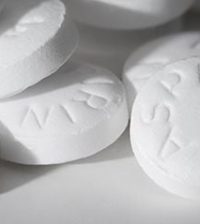- Fragments of Bird Flu Virus Found in U.S. Milk Supply
- There’s an ‘Epidemic’ of Loneliness Among U.S. Parents, Poll Finds
- Infertility Is Rising Among Young Married Women
- New Rules Mean 3.6 Million Americans Could Get Wegovy Via Medicare, Costing Billions
- ‘Dream It, Be It?’ Study Finds Teens Who Focus on Life Goals Often Succeed
- Trying ‘Magic Mushroom’ Drug to Ease Depression? It Has Side Effects
- $282 Billion: What Mental Illness Costs America Each Year
- Black, Hispanic Americans Getting Savvier About CPR
- Kids With Common Skin Conditions Face Stigma, Bullying
- Science Reveals How Aspirin Prevents Colon Cancer
Early Promise for a Blood Thinner Without the Bleeding Risk


An experimental drug appears to prevent dangerous blood clots, without raising the risk of excessive bleeding — at least in animals.
Scientists found that an injectable antibody protected rabbits from developing blood clots but didn’t cause bleeding complications — a potential side effect of all current anti-clotting drugs.
The findings, reported Feb. 5 in the journal Science Translational Medicine, are only an initial step.
The hope is to eventually bring safer clot-preventing drugs to the market, said researcher Dr. Thomas Renne, of the Karolinska Institute in Stockholm, Sweden.
Renne said his team plans to test the antibody, dubbed 3F7, in a phase I study — a small trial that tests the safety of a drug in humans.
An expert not involved in the research said these early findings “are really quite exciting.”
“The holy grail in this field is to be able to give something that prevents clots, without causing bleeding,” said Dr. Alvin Schmaier, a professor at Case Western Reserve University in Cleveland, who wrote an editorial published with the study.
Right now, anti-clotting drugs are given for a number of reasons. Doctors use them, for example, when surgery patients or critically ill newborns have to be hooked up to a heart-lung machine — a scenario, Renne noted, that would instantly cause blood clots if not for the medications.
In those cases, an IV drug called heparin has long been the choice for preventing clots, but it carries the risk of potentially dangerous, or even fatal, internal bleeding.
Another problem with heparin, Schmaier said, is that it’s messy to make. It’s isolated from pig intestines, and pig farmers in China supply much of the world’s heparin. Several years ago, tainted heparin batches from China were tied to an outbreak of severe allergic reactions and more than 80 deaths in the United States alone.
Schmaier said an alternative drug that could be manufactured under strict quality control is needed.
Renne’s team developed the new antibody based on research into a blood protein called factor XII. Factor XII is involved in the process of blood clotting, but experts have long known that people who lack the protein — about one in every one million people — do not have any special risk of bleeding.
So Renne, who is also affiliated with the University Hospital Hamburg-Eppendorf in Germany, and his colleagues studied mice that were engineered to lack factor XII. They found that the animals could not develop blood clots, but — like their human counterparts — did not suffer from bleeding. From there, the researchers developed the 3F7 antibody to block factor XII activity.
The antibody effectively blocked clot formation in rabbits that were placed on a simulation of a heart-lung device. It worked about as well as heparin, the researchers found, but without causing bleeding.
Human studies are still needed, but the researchers already know the antibody blocks factor XII in human blood.
“I think that blocking this target (factor XII) is going to prove very useful in procedures where people have to be hooked up to a machine,” Schmaier said.
Anti-clotting drugs are commonly used outside of hospitals, too. Many people take oral medications, such as warfarin (Coumadin), to prevent clots that could lead to a heart attack or stroke. Among these are patients with the heart-rhythm disorder atrial fibrillation and those with artificial heart valves.
Since 3F7 is an antibody, it would have to be injected, Renne explained. So, if it pans out, it could be an alternative to the heparin used in hospitals, but it wouldn’t replace the oral medications people use long-term.
However, Renne said, drug companies are looking for oral agents that block factor XII. “That is a longer-term goal,” he said.
Schmaier said he expects to see a lot more work aimed at factor XII. “I think this report is the tip of the iceberg,” he said.
Several of Renne’s co-researchers are employees of the pharmaceutical company CSL, which is developing the 3F7 antibody. Renne is named as inventor on a patent application covering the use of factor XII as a target of anti-clotting drugs.
More information
The American Heart Association has more on anti-clotting drugs.
Source: HealthDay
Copyright © 2024 HealthDay. All rights reserved.










